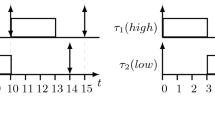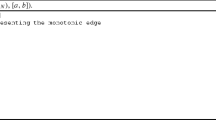Abstract
The amount of system functions realized by software drastically increased in recent years. Software tasks of safety-critical systems like those in the automotive domain have to work in a timely manner. In such systems not only ordering of events but also timing properties like end-to-end deadlines are relevant for correctness and performance. Unfortunately, due to various inter-dependencies between software tasks the analysis of such properties becomes very complex. The state-of-the-art analysis approach considers only stateless system behaviors and relies on critical instances leading to very pessimistic results. Considering task inter-dependencies would result in more accurate results, though it negatively affects the scalability of the analysis.
Our approach for scheduling analysis combines analytical and model checking methods. We consider the full state space of a system, where all interleavings and task dependencies are preserved. The state space is build in a compositional manner enabling a more scalable technique. For this, we introduce operations on the state spaces of resources, allowing the abstraction of irrelevant parts and the composition of state spaces. Based on the state space of each resource response times are determined, and timing and safety properties can be verified by means of reachability checks. The approach is demonstrated based on an example scenario.





Similar content being viewed by others
References
Alur R, Dill DL (1994) A theory of timed automata. Theor Comput Sci 126(2):183–235. http://citeseer.ist.psu.edu
Bengtsson J, Yi W (2004) Timed automata: semantics, algorithms and tools. In: Reisig W, Rozenberg G (eds) Lecture notes on concurrency and Petri nets. Lecture notes in computer science, vol 3098. Springer, Berlin
Büker M, Metzner A, Stierand I (2009) Testing real-time task networks with functional extensions using model-checking. In: Proceedings of the 14th IEEE international conference on emerging technologies & factory automation (ETFA’09). IEEE Press, Piscataway, pp 564–573. http://dl.acm.org/citation.cfm?id=1740954.1741034
Cassez F, Larsen K (1999) The impressive power of stopwatches. In: Proc of CONCUR 2000: concurrency theory. Springer, Berlin, pp 138–152
David A, Illum J, Larsen KG, Skou A (2009) Model-based framework for schedulability analysis using Uppaal 4.1. In: Nicolescu G, Mosterman P (eds) Model-based design for embedded systems, pp 93–119
Fersman E, Krcal P, Pettersson P, Yi W (2007) Task automata: schedulability, decidability and undecidability. Int J Inf Comput 205(8):1149–1172
Fersman E, Pettersson P, Yi W (2002) Timed automata with asynchronous processes: schedulability and decidability. In: Proceedings of TACAS. Springer, Berlin
Gezgin T, Henkler S, Rettberg A, Stierand I (2012) Abstraction techniques for compositional state-based scheduling analysis. In: Brazilian symposium on computing system engineering, workshop of embedded systems, Natal, Brazil
Hendriks M, Verhoef M (2006) Timed automata based analysis of embedded system architectures. In: Parallel and distributed processing symposium. doi:10.1109/IPDPS.2006.1639422
Henzinger T, Nicollin X, Sifakis J, Yovine S (1992) Symbolic model checking for real-time systems. Inf Comput 111:394–406
Krcal P, Mokrushin L, Yi W (2007) A tool for compositional analysis of timed systems by abstraction (extended abstract). In: Johnsen EB, Owe O, Schneider G (eds) Proc of the 19th nordic workshop on programming theory (NWPT’07), Oslo, 10–12 October
Lampka K, Perathoner S, Thiele L (2009) Analytic real-time analysis and timed automata: a hybrid method for analyzing embedded real-time systems. In: Proceedings of the seventh ACM international conference on embedded software (EMSOFT’09). ACM, New York, pp 107–116. http://doi.acm.org/10.1145/1629335.1629351. doi:10.1145/1629335.1629351
Macariu G, Cretu V (2009) Model-based analysis of contract-based real-time scheduling. In: SEUS, pp 227–239
Palencia Gutierrez J, Gutierrez Garcia J, Gonzalez Harbour M (1997) On the schedulability analysis for distributed hard real-time systems. In: Proceedings of ninth Euromicro workshop on real-time systems, pp 136–143. doi:10.1109/EMWRTS.1997.613774
Perathoner S, Wandeler E, Thiele L, Hamann A, Schliecker S, Henia R, Racu R, Ernst R, Harbour M (2007) Influence of different system abstractions on the performance analysis of distributed real-time systems. In: Proceedings of the 7th ACM & IEEE int conference on embedded software (EMSOFT), pp 193–202. http://doi.acm.org/10.1145/1289927.1289959. doi:10.1145/1289927.1289959
Racu R, Richter K, Ernst R (2004) Calculating task output event models to reduce distributed system cost. In: GI/ITG/GMM workshop Methoden und Beschreibungssprachen zur Modellierung und Verifikation von Schaltungen und Systemen, Kaiserslautern, Germany
Richter K (2004) Compositional scheduling analysis using standard event models. PhD thesis, Technical University of Braunschweig, Braunschweig, Germany
Rox J, Ernst R (2010) Exploiting inter-event stream correlations between output event streams of non-preemptively scheduled tasks. In: Proceedings of the conference on design, automation and test in Europe (DATE), Leuven, Belgium. http://dl.acm.org/citation.cfm?id=1870926.1870980
Thiele L, Chakraborty S, Gries M, Maxiaguine A, Greutert J (2001) Embedded software in network processors—models and algorithms. Springer, London, pp 416–434
Thiele L, Chakraborty S, Naedele M (2000) Real-time calculus for scheduling hard real-time systems. In: IEEE international symposium on circuits and systems (ISCAS), vol 4, pp 101–104. doi:10.1109/ISCAS.2000.858698
Tindell K, Clark J (1994) Holistic schedulability analysis for distributed hard real-time systems. Microprocess Microprogram 40:117–134. http://dx.doi.org/10.1016/0165-6074(94)90080-9. doi:10.1016/0165-6074(94)90080-9
Acknowledgements
This work was partly supported by European Commission funding the Large-scale integrating project (IP) proposal under ICT Call 7 (FP7-ICT-2011-7) ‘Designing for Adaptability and evolutioN in System of systems Engineering (DANSE)’ (No. 287716), and by the German Research Council (DFG) as part of the Transregional Collaborative Research Center ’Automatic Verification and Analysis of Complex Systems’ (SFB/TR 14 AVACS).
Author information
Authors and Affiliations
Corresponding author
Rights and permissions
About this article
Cite this article
Gezgin, T., Stierand, I., Henkler, S. et al. State-based scheduling analysis for distributed real-time systems. Des Autom Embed Syst 18, 1–18 (2014). https://doi.org/10.1007/s10617-013-9112-7
Received:
Accepted:
Published:
Issue Date:
DOI: https://doi.org/10.1007/s10617-013-9112-7




